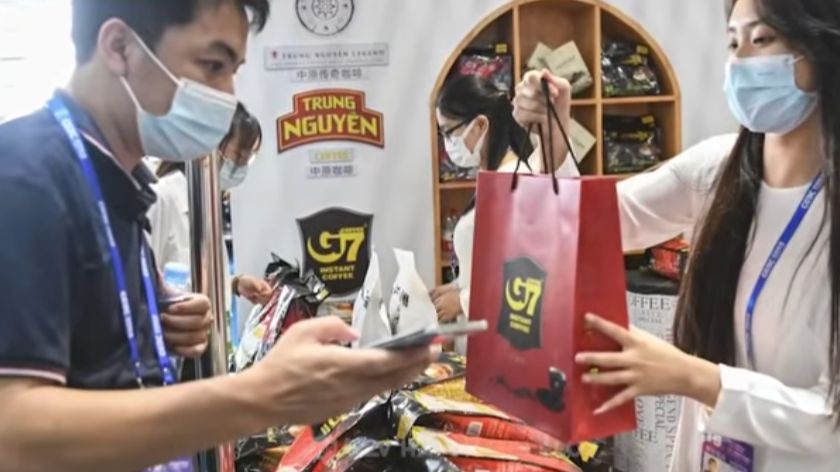Is China really dependent on Vietnamese coffee? There are rumors that the Chinese are so crazy about Trung Nguyen's G7 instant coffee that it has become a must-have gift in Vietnam. Even Vietnamese coffee chains like Trung Nguyen Legend are making waves there. Is this true? Or is it just gossip? Let's first talk about the phenomenon in the Vietnamese coffee industry. Trung Nguyen's G7 instant coffee.
G7 is often given as a gift in Tet gift boxes in Vietnam. In a country with cafes like Vietnam, instant coffee is not always loved. But for foreigners, especially the Chinese, they appreciate G7. Abroad, customers particularly prefer instant coffee. In Vietnam, on the contrary, most Vietnamese do not value this type. The reason lies in the coffee culture. Vietnam is one of the largest coffee-growing and exporting countries in the world. And the culture of coffee drinking is deeply rooted in life. Sitting on the sidewalk, savoring every drop slowly, feeling the boldness and bitterness of the coffee.
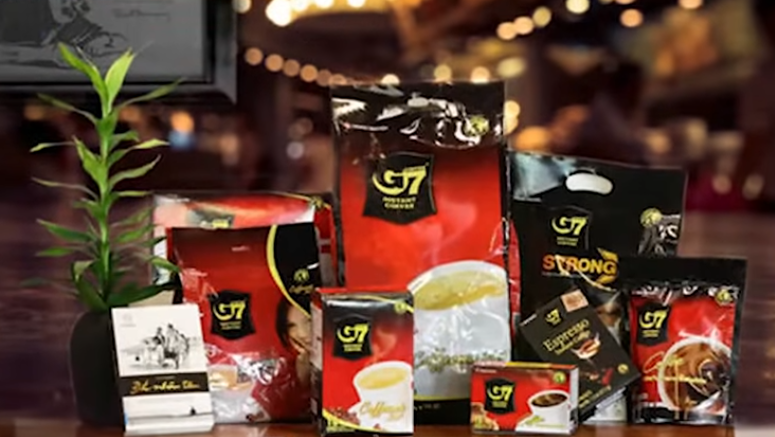
Vietnamese people are used to roasted coffee, sometimes even buying ground coffee to brew it themselves. Vietnamese instant coffee is often considered inferior or impure because its taste differs from filtered coffee, and there is a prejudice that instant coffee needs to be mixed with many additional ingredients. At the same time, foreigners, especially from countries where coffee is not grown or is grown in limited quantities, including China, see instant coffee as the epitome of convenience. They are not used to sitting in a café for hours just for it, but want coffee to be part of their dynamic lives: brewing a cup in the morning and heading to work or making it right at work.
Launched in the early 2000s, the G7 brand quickly became a symbol of Vietnamese coffee. In 2023, G7 entered the top three best-selling instant coffee brands on Chinese e-commerce platforms, second only to Nestle and one well-known brand. This is a point of pride, as G7 has surpassed other famous brands.
Why do the Chinese love G7 so much?
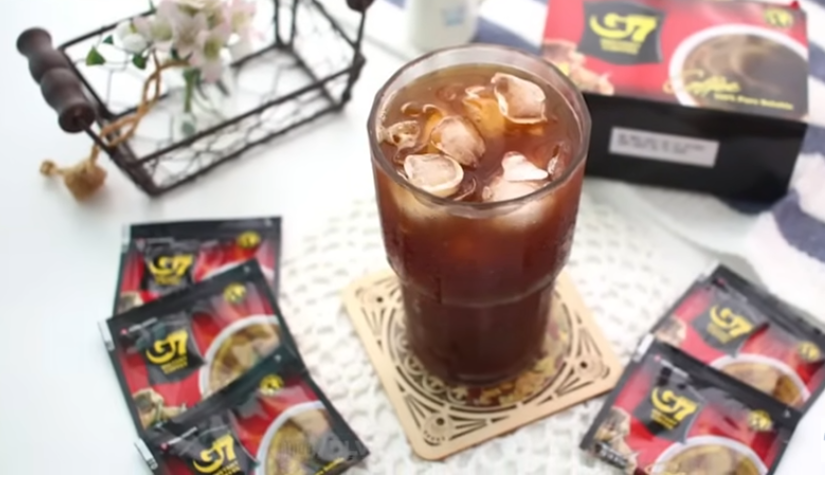
The first is the price aspect. G7 has a clear advantage. The price of G7 instant coffee in China usually ranges from 1.5 to 2 yuan, which is about 5000 to 7000 VND, much cheaper than Starbucks or other coffees, which cost 30-40 yuan. This makes G7 a convenient, cheap, and tasty choice for students, office workers, and housewives who want to drink coffee without going out. For example, many stores on e-commerce platforms sell over 200,000 G7 packets each month.
On social media platforms, reviews of videos like Vietnamese coffee tasting often attract millions of views, and G7 is almost always the trial brand praised as Vietnam's national coffee. The Chinese, especially young people, love something new and exotic. G7's strong flavor has impressed their taste buds. This flavor not only awakens them but also provides a completely different experience than the types of coffee that are often sold in China. That’s why G7 is not just coffee, but a coffee phenomenon in China.
But one interesting thing is that the Chinese love G7 coffee. It becomes a gift when Chinese tourists come to Vietnam. Every year, millions of Chinese tourists flock to destinations in Vietnam like Da Nang, Hoi An, Hanoi, or Ho Chi Minh City. And when buying gifts, they choose not only pineapple cakes, coconut candies, but also the entire G7 range.
Why?
It is not just a coffee packet, but a Vietnamese experience, a gift that must be available in Vietnam. When Chinese tourists enter a supermarket or store in Vietnam, they see G7 packets with Vietnamese packaging, a red logo, and are immediately attracted.
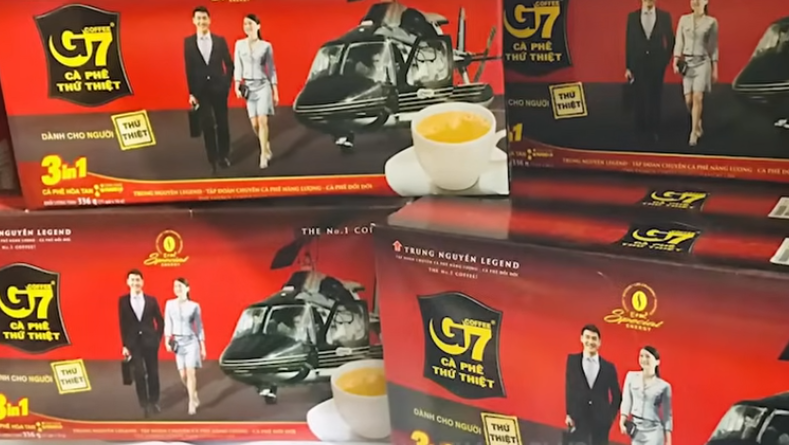
There are rumors that in China, G7 with Vietnamese packaging is sold at higher prices than English or Chinese packaging. The reason is that Chinese consumers believe that Vietnamese packaging is authentic, and original products from Vietnam should be of the best quality. From there, we have the concept of portable G7 products. I once read an online story about a Chinese tourist in Hanoi who bought about 10 boxes of G7 to bring back to his colleagues. They said that in China, G7 is not just coffee, but a way to confirm and show that in Vietnam it is a specialty that has experienced the unique coffee culture of the country.
Moreover, G7 has also scored points for convenience. The compact G7 packet, which can be quickly mixed in 30 seconds, is suitable for the busy lives of the Chinese. Office workers, students, or young people love to take it home, just tear open the packet, pour in hot water, stir well to have a delicious cup of coffee. The price is very reasonable. In Vietnam, a box of G7 costs several tens of thousands, but in China, the price can be twice that of imported goods. And still, people continue to buy. Because G7 is not just coffee, but a gift from Vietnam, and the price is several times lower, which is still cheap.
Another attraction that makes G7 draw attention in China is the brand created by Trung Nguyen.
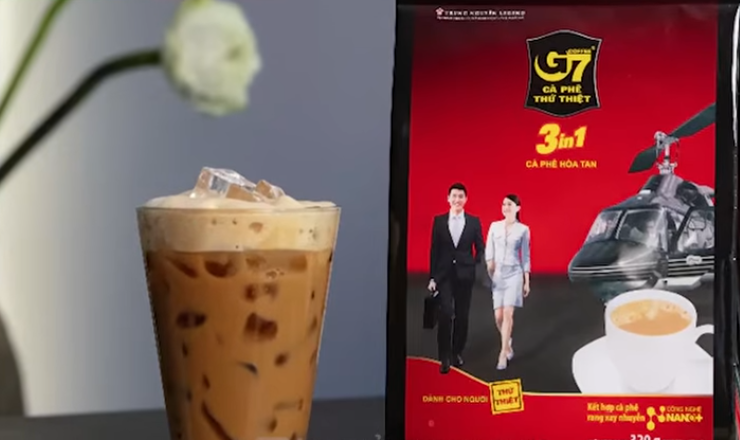
G7 sells not only coffee but also the spirit of Vietnam. Each G7 package tells a story about the Central Highlands, about the vast coffee plantations of Buon Ma Thuot, about the farmers who carefully tend to each coffee tree. Trung Nguyen also skillfully connects G7 with an inspiring creative message, creating a feeling among consumers that they are not just drinking coffee, but also charging themselves with energy for work and creativity. In China, G7 is actively promoted on e-commerce platforms and often ranks among the bestsellers in the instant coffee category.
The Chinese will leave with a strong aromatic coffee, unlike any other drink or G7 coffee, as in Vietnam. To understand why G7 is successful in China, we need to look at the bigger picture, which is the coffee market in China. This is a market that thrives every year. The Chinese, especially young people, are gradually switching to coffee instead of drinking tea. If tea was king in China, coffee is becoming part of the modern lifestyle.
But this market is also a battleground. On one side are international giants like Starbucks, with thousands of coffee shops and luxurious spaces. On the other side are domestic chains like Lukin Coffee with over 10,000 coffee shops, and the pace of opening new establishments remains the same. Lukin Coffee sells not only coffee but also technology with a very convenient ordering app, fast delivery, and low prices. Cotti Coffee is a young chain, with an average price of only about $1.8 per cup. And let’s talk about coffee chains in Vietnam, not just instant coffee.
Is it often said that chains like Trung Nguyen Legend are thriving in China, is it true or not?
In fact, the presence of Vietnamese coffee chains in China is still quite modest, but the signals are quite promising. Of course, Trung Nguyen Legend. In 2022, they opened their first store in Shanghai, and within 1 month, the store was recognized as the most popular café in the area. Customers in Shanghai, a modern and picky city, were charmed by the Vietnamese space of Trung Nguyen. From drip coffee filters to iced coffee or stories about the journey of Vietnamese coffee, all of this made people curious. They are not just drinking coffee, but experiencing a part of Vietnamese culture.
But to say that Vietnamese coffee is a storm in China seems unnecessary. Trung Nguyen has a number of stores in China, mainly in major cities, but compared to some Chinese domestic coffee brands or Starbucks, the scale is still small. And what about other chains? Currently, there is no information that some other brands from Vietnam have opened stores in China. Most of these brands are still focused on Vietnam or expanding to some Southeast Asian countries. Back to the story of G7.
Not only in China, G7 has also made a strong impression in Korea. Koreans are known for their coffee consumption. They drink coffee so much that Korea is one of the highest coffee-consuming countries in Asia. But the instant coffee taste in Korea is sweeter and thicker, like the taste in China. Before G7 entered this market, the dominant brand was Maxim of Korea, which is a three-in-one instant coffee. And when G7 appeared, Koreans were surprised because the taste was darker, the aroma clearer, but still had a sweet taste that was easy to drink.
A number of stores and supermarkets in Seoul and Busan began importing G7 coffee, and social media sites also present a new breeze from Vietnam. G7 is also purchased by Korean tourists as gifts when they come to Da Nang or Nha Trang and gradually spreads through the form of portable gifts, creating a strong word-of-mouth effect. Although in Japan, G7 has not exploded as much as in China or South Korea, there is still a group of consumers who love it, especially young people and those who are used to traveling to Vietnam. Japan is a country with a tradition of canned and bottled coffee sold in vending machines.
G7, with its diverse flavors, is considered a tourist coffee gift that reminds of Vietnam, rather than for daily consumption. Meanwhile, in Russia and Eastern Europe, G7 also enjoys popularity. The cold climate creates a demand for hot drinks, but not everyone can afford to buy high-quality roasted coffee. G7 has become a convenient and much cheaper solution than canned coffee imported from Europe.
